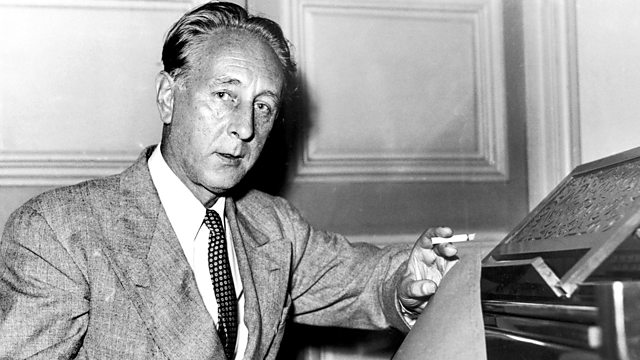
The Nomad
Donald Macleod assesses Martinu's complicated relationship with his homeland. With the art-inspired Frescoes of Piero della Francesca and the opera The Greek Passion.
Donald Macleod assesses Martinu's complicated relationship with his homeland.
Caught up in the events of the Second World War, Bohuslav Martinu spent the majority of his life living in exile. When he was born in 1890, the little town of Policka was still part of the Austro-Hungarian Empire. A period of independence for Czechoslovakia came to an end when, in 1938, Hitler annexed part of the country to Germany. By the time of Martinu's death in 1959, he was living in Switzerland, where he was receiving treatment for cancer and the Communists had assumed power in his homeland. Yet, despite his protracted absence, Martinu remained spiritually attached to his homeland and readily acknowledged the influence of its music. But equally, as we'll hear across this week, Martinu's music expresses a rich diversity of styles. From his years spent in Paris there are works informed by the popularity of jazz and by Debussy and Stravinsky in the swinging 1920s. When he moved to the United States he turned to symphonic writing. On his return to Europe, he was drawn to Renaissance Art and produced chamber music, basking in the warmth of Nice as well as turning to the poetry of his beloved homeland. Drawing on all these experiences, Martinu was a prolific composer who worked ceaselessly at his craft. He produced a treasury of more than four hundred works across every conceivable form and instrumentation, which reflect not only his roots but his thirst for novelty and inspiration.
Having lived abroad since the 1920s, in 1952 Martinu became an American citizen. Thereafter he divided his time between the United States and Europe. His final opera, The Greek Passion, is a tale of the dispossessed - perhaps a reflection of his own nomadic existence.
The Opening of the Wells (excerpt)
Prague Philharmonic Choir
Leos Cepicky, violin
Jan Schulmeister, violin
Jiri Zigmund, viola
Lenka Navratilova, piano
Nonet (3rd Movement)
The Dartington Ensemble
Cello Concerto (Andante moderato)
Jiri Barta, cello
Prague Philharmonic
Jakub Hrusa, conductor
Frescoes of Piero della Francesca
Basel Symphony Orchestra
Vladimir Ashkenazy, conductor
The Greek Passion (Act 4, Finale)
John Mitchinson (tenor), Manolios
Geoffrey Moses (bass), Fotis
Helen Field (soprano), Katerina
Rita Cullis (soprano), Lenio
Czech Philharmonic Chorus
Brno State Philharmonic Orchestra
Charles Mackerras, conductor.
Last on
More episodes
Next
You are at the last episode
Music Played
-
![]()
Bohuslav Martinů
The Opening Of The Wells
Performer: Leos Cepicky. Choir: Prague Philharmonic Choir.- Praga: PRD25001701.
- Praga.
- 1.
-
![]()
Bohuslav Martinů
Nonet H.374
Ensemble: Dartington Ensemble.- HYPERION : CDA-66084.
- HYPERION.
- 3.
-
![]()
Bohuslav Martinů
Cello Concerto - 2nd movement; Andante poco moderato
Orchestra: The City of Prague Philharmonic Orchestra.- Supraphon: SU39892.
- Supraphon.
- 2.
-
![]()
Bohuslav Martinů
The Frescoes of Piero della Francesca
Performer: Vladimir Ashkenazy. Orchestra: Basel S O.- Ondine: ODE 11582.
- Ondine.
- 5.
-
![]()
Bohuslav Martinů
The Greek passion - Act 4; Finale
Singer: John Mitchinson. Orchestra: Brno Philharmonic Orchestra. Conductor: Charles Mackerras.- SUPRAPHON : 10-3611 2.
- SUPRAPHON.
- 1.
Broadcasts
- Fri 14 Oct 2016 12:00����ý Radio 3
- Fri 14 Oct 2016 18:30����ý Radio 3
Beethoven Unleashed – the box set
What was really wrong with Beethoven?
Composers A to Z
Who knew? Five eye-opening stories from Composer of the Week
Five reasons why we love Parry's Jerusalem
What is the strange power of Jerusalem which makes strong men weep?
A man out of time – why Parry's music and ideas were at odds with his image...
The composer of Jerusalem was very far from the conservative figure his image suggests.
Composer Help Page
Find resources and contacts for composers from within the classical music industry.





